The car market in India recorded record growth in 2018
2017 was already a good year for Indian automakers, with a double-digit increase, and a similar growth was predicted for 2018, which has now arrived. A total of around 3.39 million vehicles were sold, corresponding to an increase of 5.3 percent or 170,000 units. Maruti Suzuki again and far ahead of all other manufacturers secured the top position with 1.7 million vehicles and dominated with a massive market share of around 50 percent. As of all license manufacturers (OEM), Tata Motors was able to grow the most. Numerous new product introductions and the positive effects of the Tata 2.0 initiative of the now dismissed CEO Cyrus Mistry brought growth of 25 percent for the second year in a row.
The second strongest brand is the Fiat subsidiary Jeep. The FCA Group relies exclusively on the SUVs of Jeep in India and plans to present at least one, possibly even two new launches. Ford was able to halt its downward trend and grow by 11 percent. The introduction of the new Ecosport and the Freestyle model attracted new buyers. The recently announced collaboration with Mahindra is expected to provide more momentum, but experts say it will take at least another two years for joint developments to be presented.
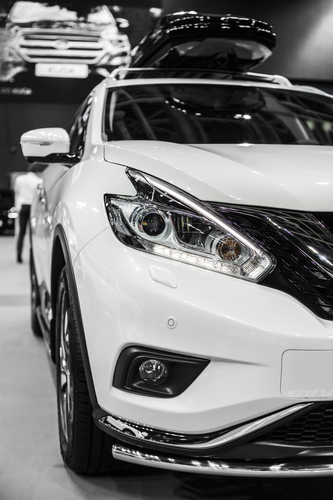
In addition to passenger cars, other segments also increased in the double-digit range. The outside India largely unknown Hero MotoCorp, the country’s largest two-wheeler manufacturer, grew by 11.4 percent and sold a total of 7.8 million units. In second place follows with Honda a well-known manufacturer, while the next three following places with TVS engine, Bajaj car and Royal Enfield are again from India. In terms of commercial vehicles, the number of vehicles sold exceeded 1 million in 2018 for the first time. Here Tata Motors leads the sales figures with 448,000 units and a growth of about 30 percent.
In the luxury vehicles segment the German manufacturers clearly lead, the market grew by 3.5 percent overall. With a share of almost 40 percent, Mercedes is the market leader, followed by BMW and Audi. However, the Ingolstadt-based company had to record a sharp decline of 18 percent when one of the main dealers in the wealthy region of Delhi, Gurgaon and Noida, had to close. However, most companies and investors are confident about the future of the Indian automotive market.
Benefit from the growth in India. The export of products there, especially cars and car parts, in many cases requires a mandatory India certification according to the Automotive Industry Standard (AIS). We advise you gladly and comprehensively with the AIS certification for India.
70th anniversary of the Toy Fair in Nuremberg
For five days, exhibitors, visitors and buyers of the toy industry came together in Nuremberg to celebrate the 70th anniversary of the world’s biggest toy fair. From January 30, 2019 to February 3, 2019 over 2880 companies came to the industry’s most important fair in order to present the 68.000 visitors their newest product innovations.
The international participation remained high this year with companies from 68 countries and visitors from 131 nations. This provides the exhibitors ideal conditions for attracting new customers, which is the most important objective for each participating toy producer.
The quality of the fair was also reflected by the numerous innovations, that were brought to Nuremberg by the toy companies. In total, about 120.000 innovative new toys were presented, spread over 18 halls. A greater interest in electronic toys was accounted for by new, forward-looking measures, including an improved hall structure.

The growing number of CCC certifications from manufacturers that do not produce in China is also showing the growing international interest in the Chinese toy market. More and more well-known manufacturers are pushing for the Chinese market and must go through the associated China CCC certification in order to do so.
MPR China Certification GmbH accompanies their customers right from the start and supports them with a smooth certification process.
If you are looking for more information about CCC for toys, please do not hesitate to contact us directly. Just send us an e-mail, or call us (UK: +44 2071931135, Rest of Europe: +49 69 2713769150, US: +1 773 654-2673).
For more information about CCC certification in general, the process, and the associated costs, please visit our website and our News Section where you will find current updates twice a week.
You can also check out our free CCC-Brochure, which can be downloaded right here as a PDF file or you consult our book (in English) “A Brief Guide to CCC: China Compulsory Certification”, which can be found directly hier on Amazon.
The entry of the sporting goods industry into the Chinese market is worthwhile
While sporting goods manufacturers in the saturated markets of Europe and North America have to fight hard for their customers, Asia and China in particular are offering excellent conditions and high growth potential. Various developments in recent years seem to confirm this forecast. One of the reasons is the growing middle class in China, which is ready to spend its money on sports and health products. Add to that the large number of 415 million in the Millennials or Generation Y age group, as well as recent support and sponsorship by the Chinese government for the sporting goods industry.

Also other industries such as electronics industry or software manufacturers can benefit from the growth of the sports market because an increasing awareness of the Chinese people for a healthy lifestyle is observed. An indicator for that could be the number one Chinese fitness apps, Keep. It reached 100 million users in August 2017 compared to 23 million in the US and 20 million in Europe. Another growth market apart from fitness apps are the so-called “wearable devices” such as motion sensors or smartwatches. Both industries, apps and handheld devices, generated more than $ 6.5 billion in revenue in China in 2017.
In the face of a growing middle class and increasing prosperity, this segment of the population has significantly more time to actively spend their leisure time and to spend some of their free time with sporting activities. According to the IBISWorld study, China’s annual growth in fitness and health is a remarkable 11.6 percent, generating more than $ 6 billion in revenue in 2016, and rising. If one compares this data with established markets such as the USA, the annual turnover amounts to 30 billion dollars but with only a low growth rate of 2.5 percent. Therefore, analysts and experts are now advising foreign companies to invest in the Chinese sporting goods market to capitalize on growth opportunities. Like other products, many sporting goods must also undergo the mandatory CCC certification process. We are glad to advise you in the context of this China Compulsory Certification (CCC).
For more information on how CCC certification may affect your company, or for more information about CCC certification in general, the process, and the associated costs, please visit our website and our News Section where you will find current updates twice a week.
Please do not hesitate to contact us for further details and consultation. You can contact us via e-mail, or call us (UK: +44 2071931135, Rest of Europe: +49 69 2713769150, US: +1 773 654-2673).
You can also check out our free CCC-Brochure, which can be downloaded right here as a PDF file or you consult our book (in English) “A Brief Guide to CCC: China Compulsory Certification”, which can be found directly here on Amazon.
India welcomes China’s engagement in electric vehicles
At a top meeting of Indian industry representatives in the field of electromobility under the title “Global Zero Emission and All Electric” they discussed a cooperation between India and China. The Chinese delegation was represented by Chen Quingtai, president of China EV100, which represents more than 200 leading electric car industry companies. This association also organizes the fifth China EV100 Forum in Beijing. The situation is overshadowed by the first-time decline in car sales in China for 20 years. The world’s largest car market currently shrank by 6 percent to 22.7 million vehicles in 2018. The decline is partly due to a weaker Chinese economy, as well as stricter vehicle registration regulations in major cities and the US trade dispute.
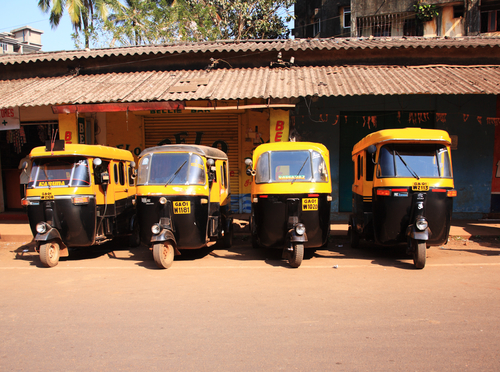
Nevertheless, the so-called New Energy Vehicles or NEVs with electric and hybrid drive could record an increase both in China and in India. A significant step was taken this month when Elton Musk, CEO of Tesla, broke ground in Shanghai for a new factory. The project, which has a $ 7 billion investment, is the first fully foreign-invested enterprise after the change in Chinese government policy on joint ventures. It is also the first Tesla manufacturing facility outside the US and will have an annual capacity of 100,000 vehicles.
At the meeting of Chen and the Indian representative Anil Srivatsava of National Institution for Transforming India (NITI), a commission of experts pursuing the achievement of sustainable development goals in India, great potential for cooperation in the field of electromobility has been identified by both countries. Leading Indian car manufacturers such as Maruti Suzuki, Tata and automotive suppliers participated in the meetings. India plans that by 2030 at least 30 percent of vehicles sold will be electrically powered. Srivatsava encouraged the establishment of an industrial association in India, similar to the China EV100, as well as regular meetings. He also suggested that industry and business representatives meet at a summit in Beijing or another city in the first half of 2019 to discuss possible cooperation.
Do you want to export your products to India? Electrical and automotive products must comply with the Indian Automotive Industry Standard (AIS) and pass an India certification (AIS certification). We are glad to assist you.
China invests in foreign sound technology
The Finnish company Flexsound Augmented Audio is now working with the Beijing start-up COMB+. The two companies signed an agreement for an investment by the Chinese partner as well as a joint development and marketing in China. The products and technology of Flexsound Augmented Audio enable the user to feel the sound effects as well as music. Patented applications already exist for movie theaters and vehicles, as well as a home-use product, the HUMU Augmented Audio Cushion, a kind of cushion for creating sound effects while watching TV, playing computer and listening to music.
The start-up COMB+ from Beijing deals with the promotion of international business start-ups, for which they see a high potential for the Chinese market. Furthermore, COMB + offers services such as finding suitable local partners in development, marketing and financing. COMB+ has chosen Flexsound as a partner because of its outstanding technology and the high potential for growth in the Chinese market.

As another foreign company in the field of audio technology, Fraunhofer IIS (Institute for Integrated Circuits) was able to gain a foothold in China. The encoding process developed by Fraunhofer IIS was selected by the Chinese commission “AVS 3D Audio Task Group” as standard for the 3D sound output for the upcoming broadcast of the Chinese 4K UHD television. IIS has proposed its MPEG-H TV audio system in line with the requirements of the upcoming next generation Broadcasting Audio Standard in China to meet the demand of the Chinese market for a convincing and high-quality audio output.
China is considered as one of the emerging markets in the music industry and can record huge growth rates. 2017 was one of the most successful years in the Chinese music industry, according to the statistics of the music association IFPI, China was able to rise for the first time in the top 10 of the world sold recordings and marketing rights. The largest share in China is provided by streaming services from Tencent or NetEase. According to experts, the boom can benefit many industries. This ranges from the actual music industry to infrastructure for data storage and streaming, devices such as smartphones and their corresponding output devices such as headphones and speakers. Many audio-products must bear the logo of the CCC certification (China Compulsory Certification) and be certified accordingly before they can be offered on the market. We are glad to advise you regarding the CCC certification.
For more information on how CCC certification may affect your company, or for more information about CCC certification in general, the process, and the associated costs, please visit our website and our News Section where you will find current updates twice a week.
Please do not hesitate to contact us for further details and consultation. You can contact us via e-mail, or call us (UK: +44 2071931135, Rest of Europe: +49 69 2713769150, US: +1 773 654-2673).
You can also check out our free CCC-Brochure, which can be downloaded right here as a PDF file or you consult our book (in English) “A Brief Guide to CCC: China Compulsory Certification”, which can be found directly hier on Amazon.
China announces the mass production of solid-state batteries
Solid-state batteries are considered to be the next stage of development after lithium-ion batteries and an important future technology for upcoming e-cars. So far, however, solid-state batteries have only been produced in small series in the laboratory and not for a mass market. The fundamental difference with lithium-ion batteries is the replacement of the liquid electrolyte by a solid material. The advantages are a higher energy density and as a result a lower weight or more range and the elimination of the cooling system, which saves additional costs and weight. In addition, the solid-state technology is considered safer, as it cannot lead to fire or leakage of the electrolyte in accidents.
Although many automakers have already announced that they want to equip their vehicles with solid-state batteries, no manufacturer or supplier has succeeded in producing them in series production. In Europe, the current offensive in battery cell production is also based on solid-state technology. However, companies like LG Chem, Samsung SDI and SK Innovation are already exploring the battery technology of the future and VW is also involved with Californian technology company QuantumScape Corporation to develop solid batteries for its vehicles.
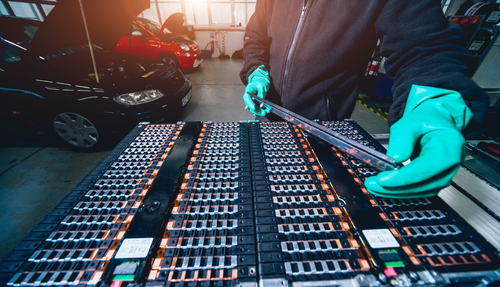
For the first time, information about solid-state batteries was published in a journal by a team from Tohoku University in Japan and Tokyo Tech. Now a Chinese start-up should have made the decisive breakthrough and started mass production of solid-state batteries. The young company was founded at the well-known University of Tshinghua and is called Qing Tao Energy Development. The research and development costs are estimated at more than 140 million euros, and a plant has been built in Kunshan, east of China, and has already been put into operation. The solid-state batteries produced by Qing Tao Energy Development have an energy density of 400 Wh / kg compared to conventional lithium-ion batteries with a maximum of 200 Wh / kg. The new plant has a production capacity of 100 MWh per year, which is sufficient only for 2,000 to 4,000 electrically driven vehicles. In comparison, Tesla’s Gigafactory comes to 20 gigawatt hours, but with conventional lithium-ion batteries. For this reason, Qing Tao Energy Development plans to increase its production volume by a factor of 7 by 2020. If you are already producing in China or considering an investment, remember that many industrial products must pass the mandatory CCC certification. We advise you and support you throughout the China CCC process.
For more information on how CCC certification may affect your company, or for more information about CCC certification in general, the process, and the associated costs, please visit our website and our News Section where you will find current updates twice a week.
Please do not hesitate to contact us for further details and consultation. You can contact us via e-mail, or call us (UK: +44 2071931135, Rest of Europe: +49 69 2713769150, US: +1 773 654-2673).
You can also check out our free CCC-Brochure, which can be downloaded right here as a PDF file or you consult our book (in English) “A Brief Guide to CCC: China Compulsory Certification”, which can be found directly hier on Amazon.
VW subsidiary Skoda will enter the Indian market
With a new strategy and the “India 2.0” project, the Volkswagen Group wants to benefit from the growth in the world’s third-largest car market with its subsidiary Skoda India. Under the leadership of the Indian spin-off of Skoda, eight new models are to be developed and produced in the next 18 months, four of them exclusively for the Indian market. It should be an SUV and a sedan, which are each sold under the name Volkswagen and Skoda. According to unconfirmed sources, the basis of the vehicles is the Volkswagen MQB platform, the SUV could also be the Volkswagen T-Cross. It is planned to launch a new model every six months, with the sales launch planned for March 2021. The project “India 2.0” also includes the expansion of India as a location for export. Four models with left-hand drive vehicles, two each from Volkswagen and Skoda, are to be produced from 2022 onwards.
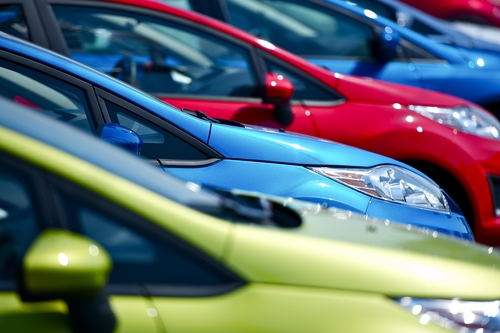
Volkswagen has just recently completed its first meeting with automotive suppliers in India. High-ranking Volkswagen representatives announced that they see high growth potential in the Indian automotive market and therefore it is important to define a long-term strategy and to have a good position in the market. One of India 2.0’s main goals is the creation of profitable and cost-effective manufacturing facilities. The project has an investment volume of approximately $ 1.13 billion, and one of the key pillars of the strategy is the establishment of a new development and design center in Pune, India in late 2019. For a competitive price of the vehicles, the platform MQB A0 IN will be developed with a local supplier share of 90 percent.
With their strategy, Volkswagen and Skoda hope to become a mass producer in India with a target of 5 percent by 2025. In this context, the production capacities of the existing plants are to be continuously expanded over the next few years. In addition, the Volkswagen Group is planning new alliances and partnerships in the Indian automotive market in order to be more innovative in the market.
Are you planning to export your products to the Indian market? Automotive products must comply with the Indian Automotive Industry Standard (AIS) and be certified. We are glad to assist you with the India Certification (AIS Certification).
China remains the most important market for the German machine tool industry
The further opening of the Chinese economy to foreign companies benefits in particular the German mechanical engineering industry. “We receive very positive signals from representatives from various ministries and associations in China,” said VMDA President Carl Martin Welcker during a delegation trip to Beijing. So far open issues such as equal conditions for foreign investors, the protection of know-how and intellectual property as well as data security are being taken more and more seriously by the Chinese partners.
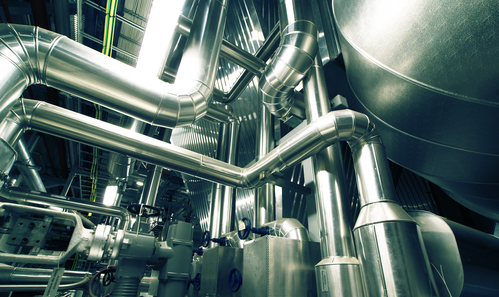
As part of the government’s “Made in China 2025” strategy, they want to modernize the economy from quantity to quality. “To do so, machinery and systems from Germany could play an important part in this, and at the same time increase the competitiveness of Chinese companies,” explained VDMA President Welcker in Beijing. German mechanical engineering companies, including many SMEs, have been investing in China for years, and their number has grown to around 750 companies. This commitment has created tens of thousands of skilled and well-paid jobs in China and has contributed significantly to local technological development. Qualification and training of employees is an important topic for German companies in China, and vice versa, the good and solid level of training in Germany is well-known and receives great appreciation.
In the meantime, both sides, Germany and China, are benefiting from a good market and order situation. The export of machinery from Germany to China recorded an increase of 25 percent in the first eight months of 2017. Conversely, machines and capital goods worth 4.3 billion euros were imported into Germany from China, which represents an increase of 10 percent compared to the previous year. China has become the most important machine supplier for Germany. Many products that are exported to China must undergo CCC certification. We are glad to advise you on whether your products are affected and support you with the China CCC certification.
For more information on how CCC certification may affect your company, or for more information about CCC certification in general, the process, and the associated costs, please visit our website and our News Section where you will find current updates twice a week.
Please do not hesitate to contact us for further details and consultation. You can contact us via e-mail, or call us (UK: +44 2071931135, Rest of Europe: +49 69 2713769150, US: +1 773 654-2673).
You can also check out our free CCC-Brochure, which can be downloaded right here as a PDF file or you consult our book (in English) “A Brief Guide to CCC: China Compulsory Certification”, which can be found directly here on Amazon.



